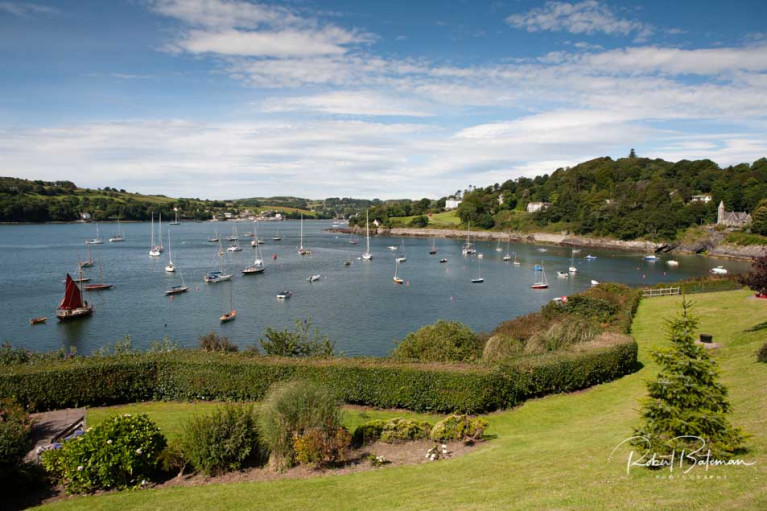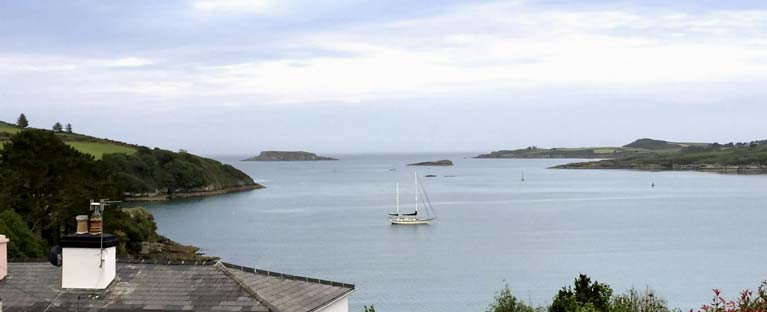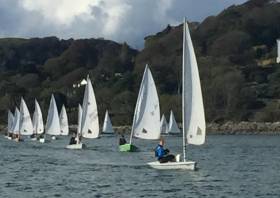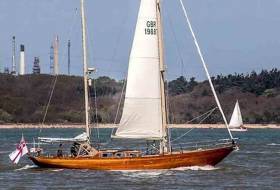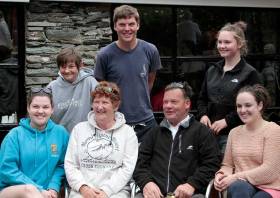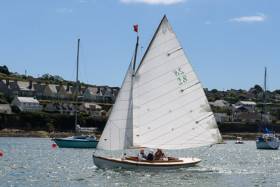Displaying items by tag: Glandore Harbour Yacht Club
The Dragon Derby was established in 1987 by Don Street who presented, as a perpetual trophy, a ship’s decanter — together with sponsorship of two bottles of Mount Gay rum each year. Tradition has it that the competitors and support team consume all the rum after the award of the trophy, writes Glandore Harbour Yacht Club Commodore Tim Forde.
The event schedule is 14 races sailed over a weekend, seven races each day, each approximately 20 minutes long. In the early days of the smaller Dragon fleet (five/six boats) racing was held in the inner harbour, providing excellent viewing for spectators. The current larger fleet (10-plus boats) requires more room and races are sailed in the outer harbour between Adam and Eve Islands.
The 2023 Derby — aka the Demolition Derby — was sailed over the weekend of Saturday 1 and Sunday 2 July. Forecast for winds on Saturday were on the limits for Dragons so the race committee decided that no spinnakers would be allowed on the first day. This rule was relaxed for the last race of the day. Recorded wind speed during the racing was 24-26 knots with gusts up to 33 knots.
The racing was very close, especially between Aphrodite, Magic and Supremacy who all scored first places, with Pongo and Leah close on their sterns. Unfortunately Phyloong, War Baby and Zu were early retirees. At the end of the day Aphrodite held the overnight lead with 10 points, with Magic and Supremacy tied on 13 points. Gypsy, with a reefed mainsail, sailed out to the race area but did not join in.
The forecast for Sunday was for lighter winds so the no spinnaker rule was dropped. The tussle between the top three boats continued with Pongo and Phyloong helping to mix it up. Wind speeds recorded by the Race Officer were 20-22 knots, gusting to 25 knots.
By race 11 only three boats were left racing after Supremacy, Pongo, Leah, Phyloong, War Baby and Gypsy had all retired. Gypsy finished Race 8 with a credible seventh place in front of Zu and War Baby. The competition was very close right up to the end making for a nail biting finish.
Unbeknownst to the Dragons on the water, Aphrodite and Magic were tied in first place after Race 13. Over-eager Aphrodite was OCS in Race 14 and Magic and Zu were clear away to the windward mark, with Magic getting the winning result.
The event really lived up to its name of the Demolition Derby — only two Dragons finished all 14 races.
The Dragon Derby decanter, filled to the brim with Mount Gay Rum was presented to Tiernan Brown, Magic’s skipper, and his crew over the two days, Alex O’Donoghue, Jessica Tubb, Mia Scarlet, Domnhall Coffey and Michelle Hayes.
Everyone enjoyed a sip or shot of rum standing in sunshine outside Waters & Wild and in the best tradition the decanter was finished to the last drop of rum!
Thanks were expressed to the race support team, ROs Diarmaid and Mary O’Sullivan, support and mark boat drivers and helpers, Paul Hardy, Lily Fitzpatrick, Christian Hoolihan, Heather Mahmood, Nicola O’Donovan, Declan O’Sullivan and Aoife Golding.
Glandore Harbour Yacht Club 'Blessed with Volunteers'
Glandore Harbour Yacht Club members, at their annual general meeting, gave their award for Exceptional Service to Orla Sheehan.
Re-elected as Commodore of the West Cork club Tim Forde, said the club was “blessed with the great number of dedicated volunteers” and extended “special thanks to everyone for all the help they gave the Club throughout the year especially highlighting our Issues with Cork County Council regarding Glandore Harbour Pier.”
Treasurer Richard Bradburn reported in detail on the generally good financial health of the club as well as the reserves available to help deal with unforeseen events.
Costs are increasing significantly in several areas and the membership approved a modest fee increase. The Club also additionally continues to put away reserves annually.
Directors/Officers elected were: Tim Forde, Richard Bradburn, Mary O Sullivan, and Carla Miles. Flag Officers: Commodore Tim Forde; Vice Commodore Carla Miles; Treasurer Richard Bradburn; Sailing Secretary Hal Andrews, Honorary Secretary Mary O Sullivan. Operations Committee: The Flag Officers plus: Cliff Jeffers, Membership Secretary; Myriam O'Connor, Social Secretary; Kevin Percy- Training Centre Manager; Jean Fuller, Junior Organiser.
Diarmuid O Sullivan has taken over as Club Health and Safety lead and will continue to act as liaison with the local authority for event planning purposes.
Michelle Hayes has joined the Sailing Committee as assistant to the Sailing Secretary.
The Endeavour Trophy (Rossa Lordan) was awarded in absentia to Moana Leyden by Kevin Percy.
35th Dragon 'Derby' Staged By Glandore Harbour Yacht Club
The Dragon Derby was founded by Don Street in 1987 at Glandore Harbour Yacht Club in West Cork.
Fourteen races were sailed over two days in this year’s event, the 35th Derby. Challenging light winds dictated the first day of seven races in the inner harbour, with three boats tied at the top on 7 points - Zu, Moonshine and Sonata.
The wind freshened to 10-12 knots from the South East on the second day giving Race Officer David Forde the opportunity to set longer courses, resulting in five different boats winning a race each. Kevin Hayes, with Deidre Potenz and Paul Beechinor, sailed Sonata to the top, finishing with 24 points that included four race wins. Second was Phyloong on 28 and third Moonshine on 30.
Squibs and Dragons will sail the 1908 Race scheduled for July 30, with the Gordon’s Cup dinghy event on the following day.
While Kinsale Yacht Club cruisers boats were racing around the Kowloon Bridge Buoy and the club also staged the Squib south coast championships, another West Cork Yacht Club was staging a Glandore Harbour race for Dragons and Squibs to Castletownshend.
11 Dragons and 11 Squibs sailed in the annual race in ideal sailing conditions of 10 to 12 knot breezes last Saturday.
In the Dragon fleet, Sonata, in her first major event since being relaunched by her new owners this week, was the winner, ahead of Aphrodite second and War Baby in third.
Trojan was the first Squib home followed by Tequilla Chaser in second and Kingfisher in third place.
Fergus of Mary Ann’s Bar in Castletownsend provided bottles of wine for the prizewinners.
Diarmuid O’Donovan of Glenmar Shellfish donated lobsters for the winning boats in the race back to Glandore. The first Dragon was Aphrodite, the first Squib was again Trojan,
Glandore Harbour Yacht Club in West Cork draws its membership from a wide catchment area. It is surveying the members to get their views on how the club’s sailing season can deal with the current restrictions imposed by government under COVID-19 requirements.
After nine months of preparation, the club had to decide late last week to cancel their biennial Classic Boats Regatta which has become a national and international attraction. It drew large crowds to the village, both sailors and tourists, to see the event and was a big economic boost to the area.
‘Social distancing’ requirements had a large effect on the decision to cancel the regatta in July, which would have dovetailed with the Royal Cork Yacht Club’s Tricentenary Celebrations.
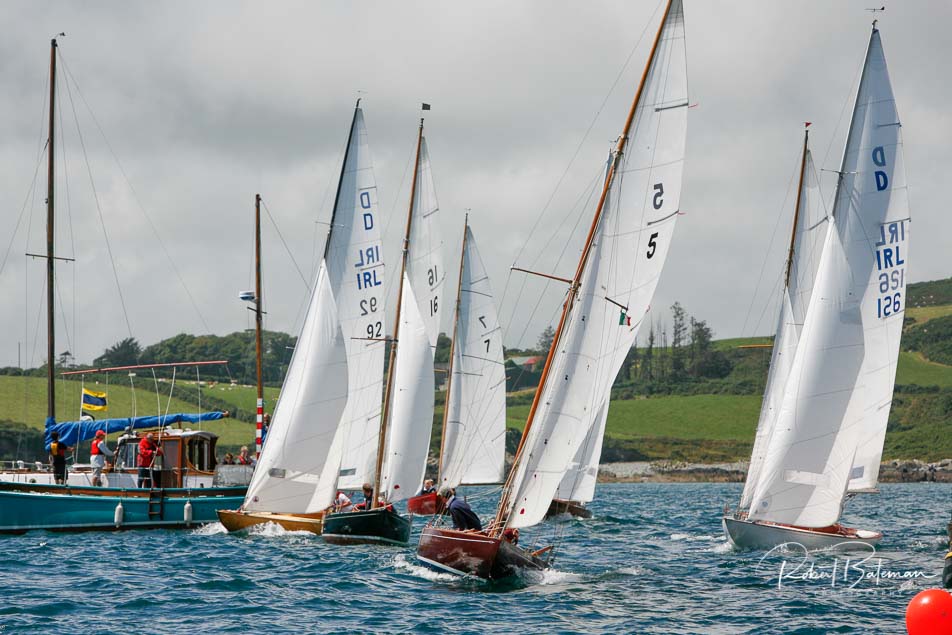 Racing at a previous edition of Glandore Classics Regatta Photo: Bob Bateman. Scroll down for a gallery of photos below
Racing at a previous edition of Glandore Classics Regatta Photo: Bob Bateman. Scroll down for a gallery of photos below
The situation which the club faces is explained in this week’s Podcast by its Sailing Secretary, Hal Andrews, who says that it is “really a nightmare to organise sailing” under the social distancing requirements.
"Social distancing’ requirements had a large effect on the decision to cancel the regatta"
That is becoming evident at many clubs around the country. Irish Sailing is in discussion with Sport Ireland about the difficulties presented to the sport by the restrictions.
Podcast with Hal Andrews of Glandore YC below and a gallery of photos by Bob Bateman of the 2007 Glandore Classic Regatta brings back memories of the beauty of vintage sailing boats in West Cork.
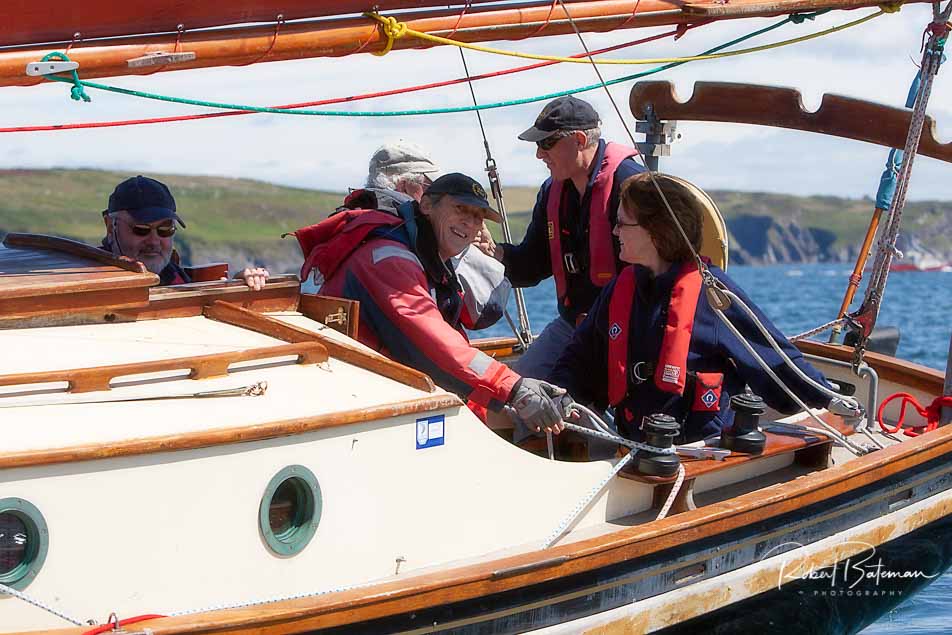
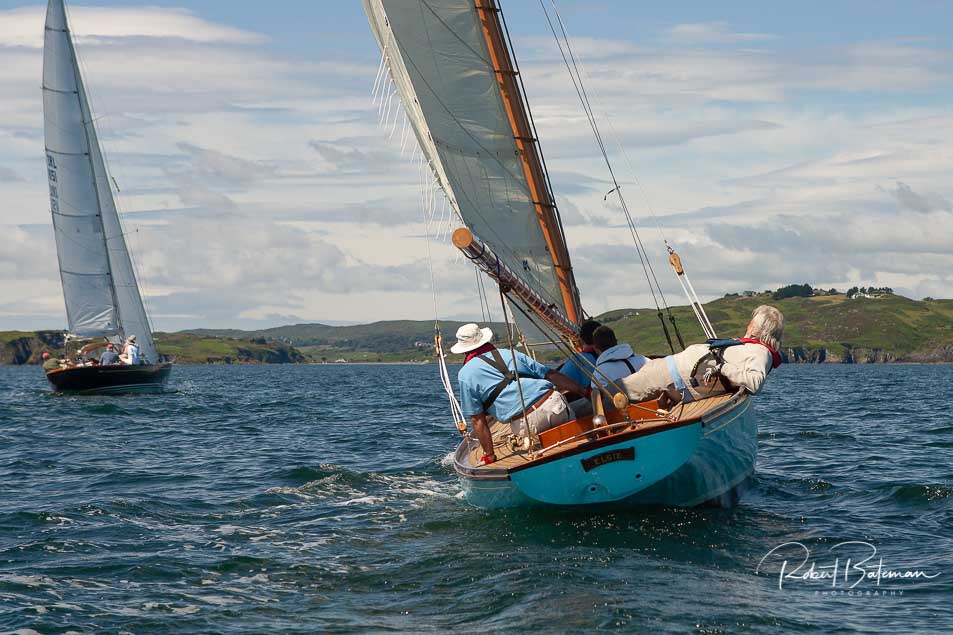
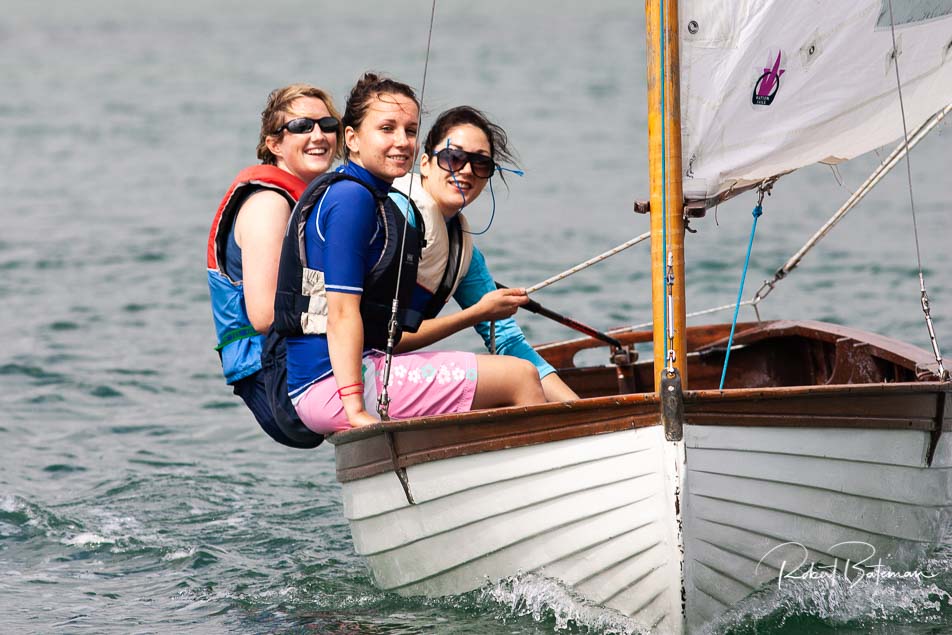
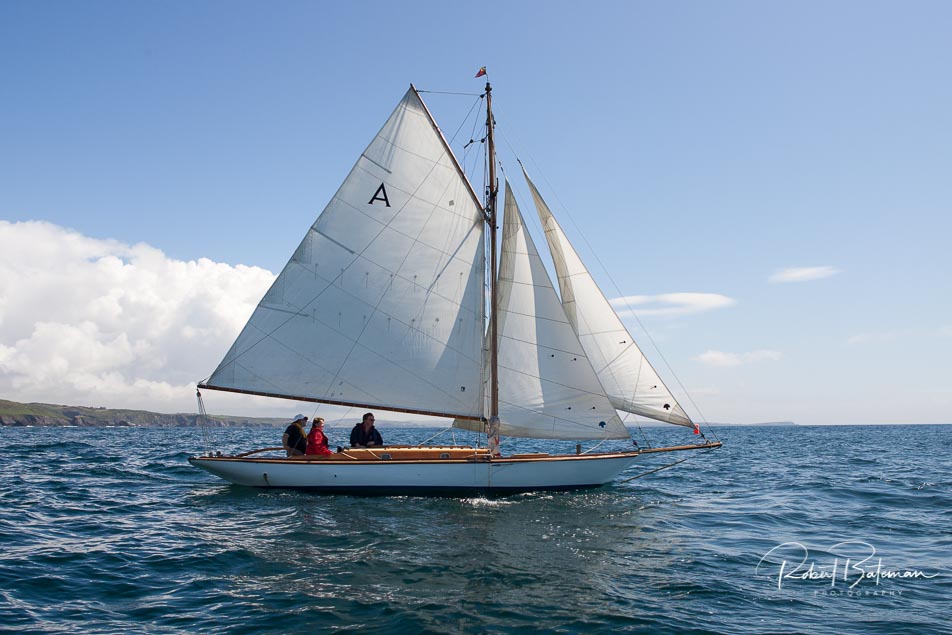
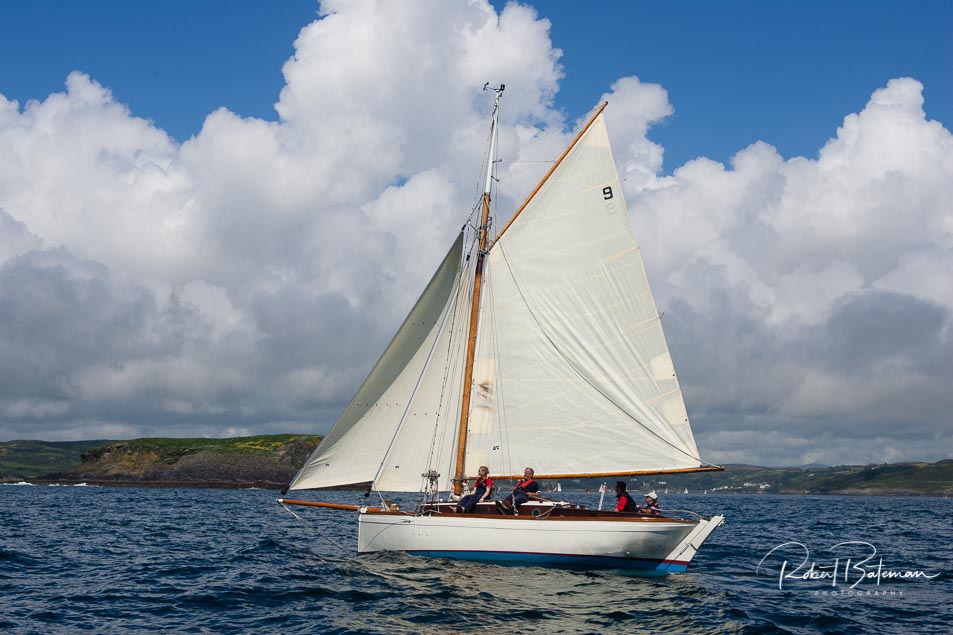
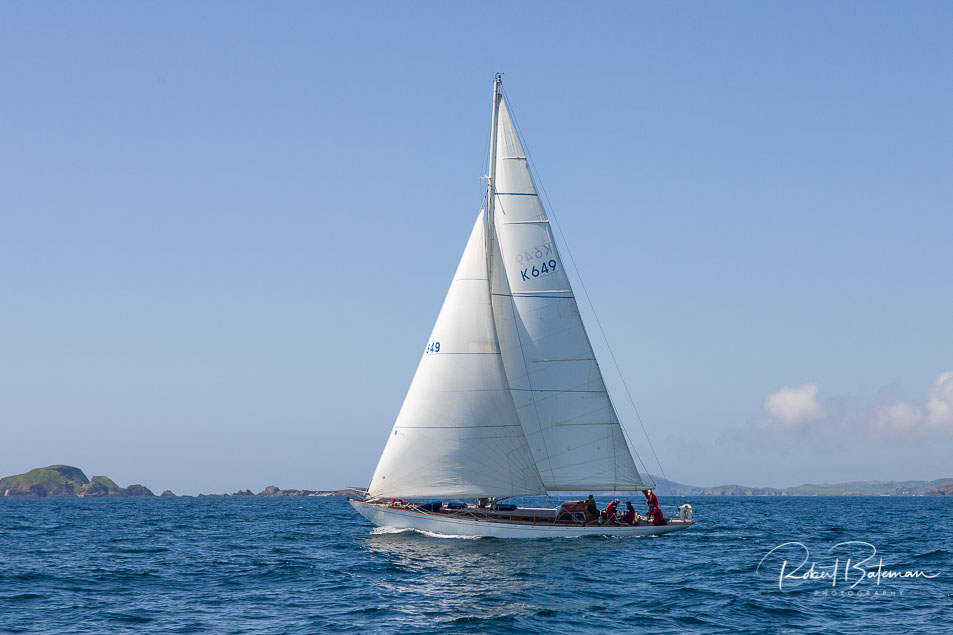
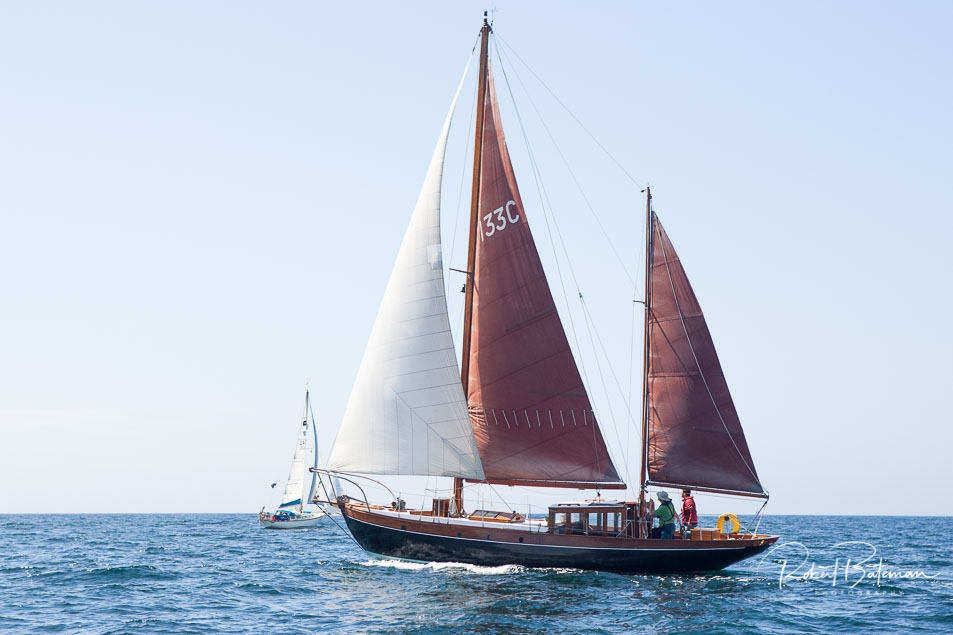
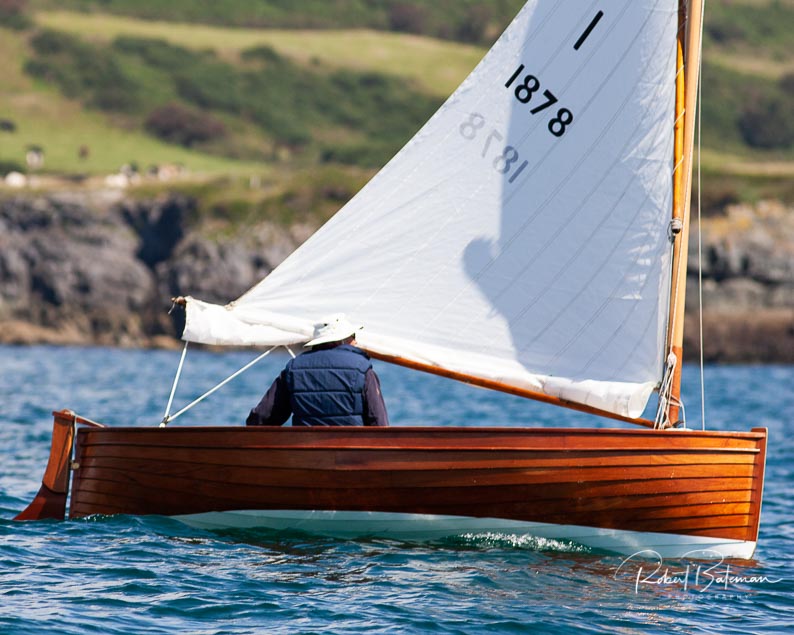
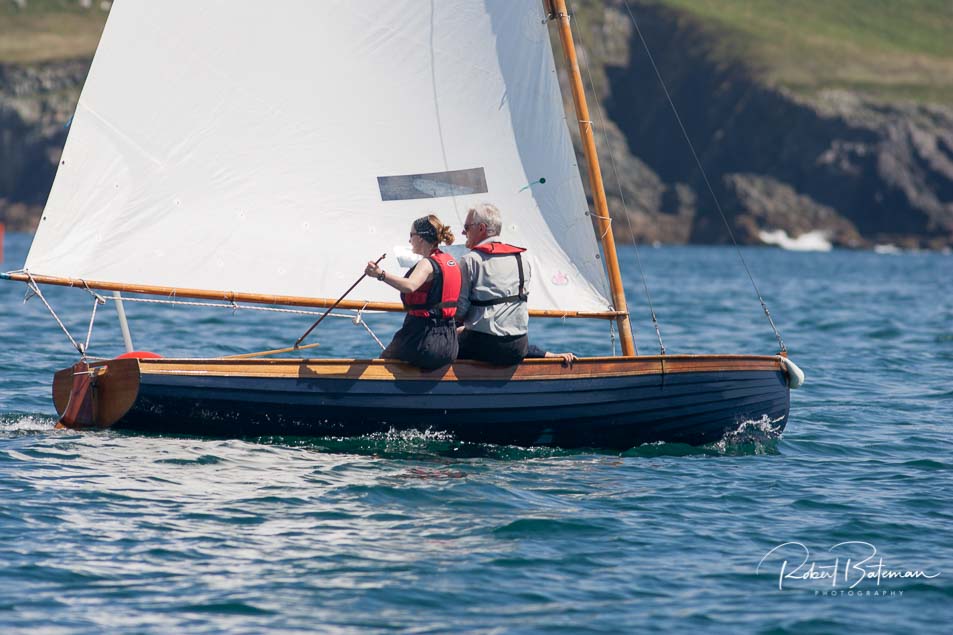
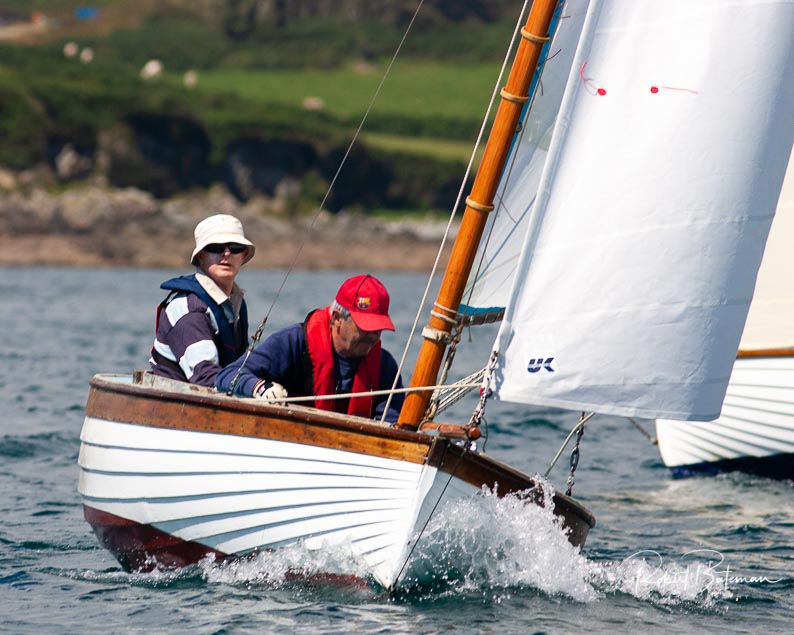
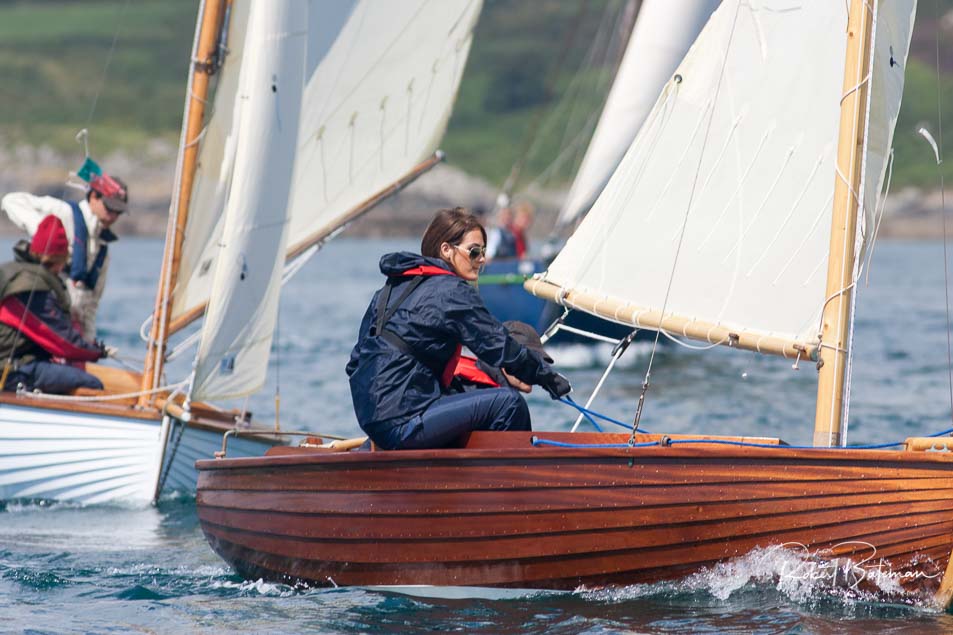
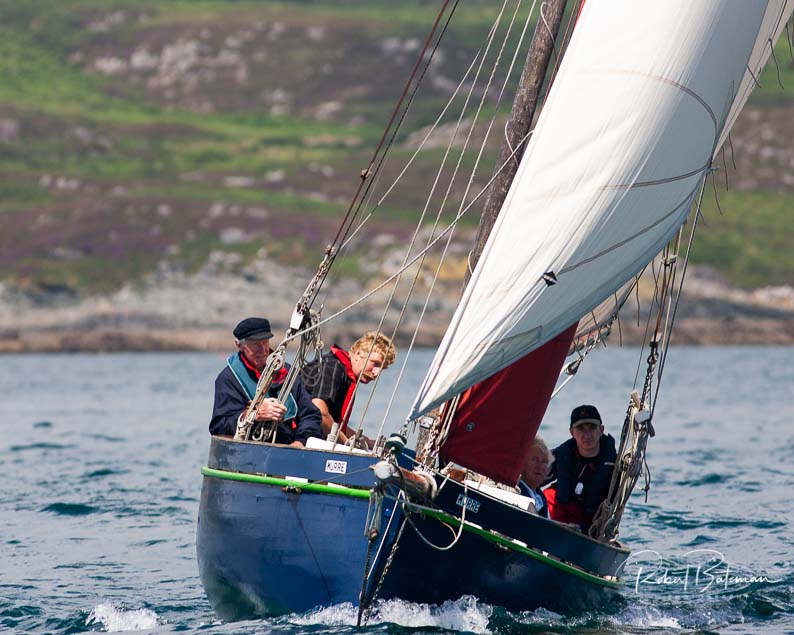
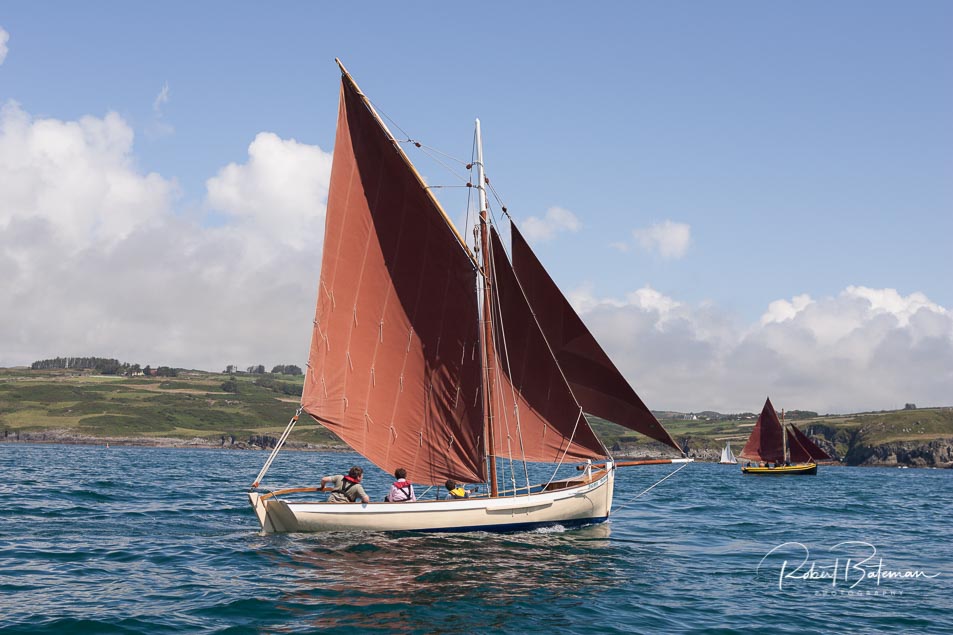
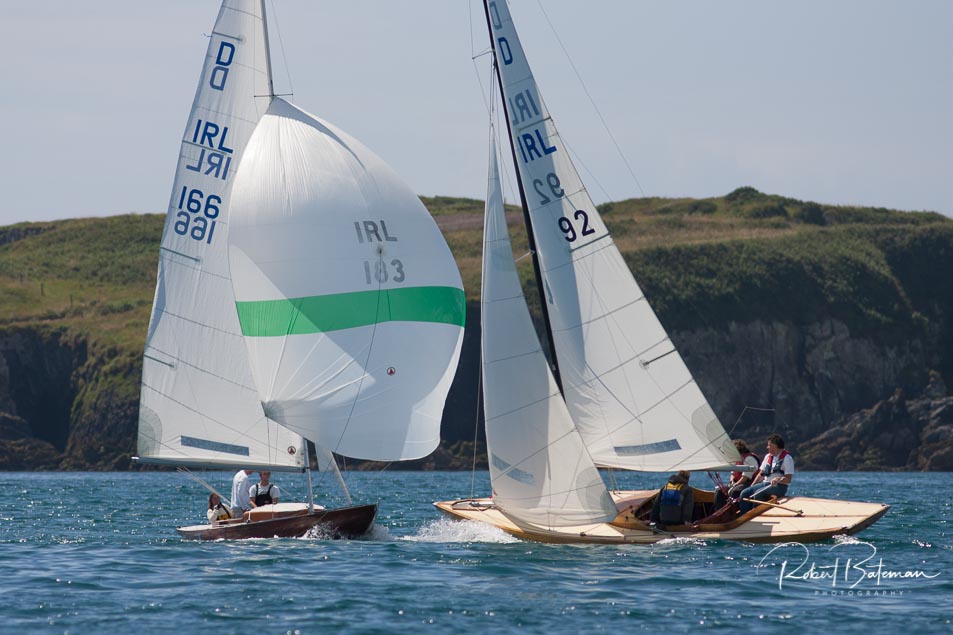
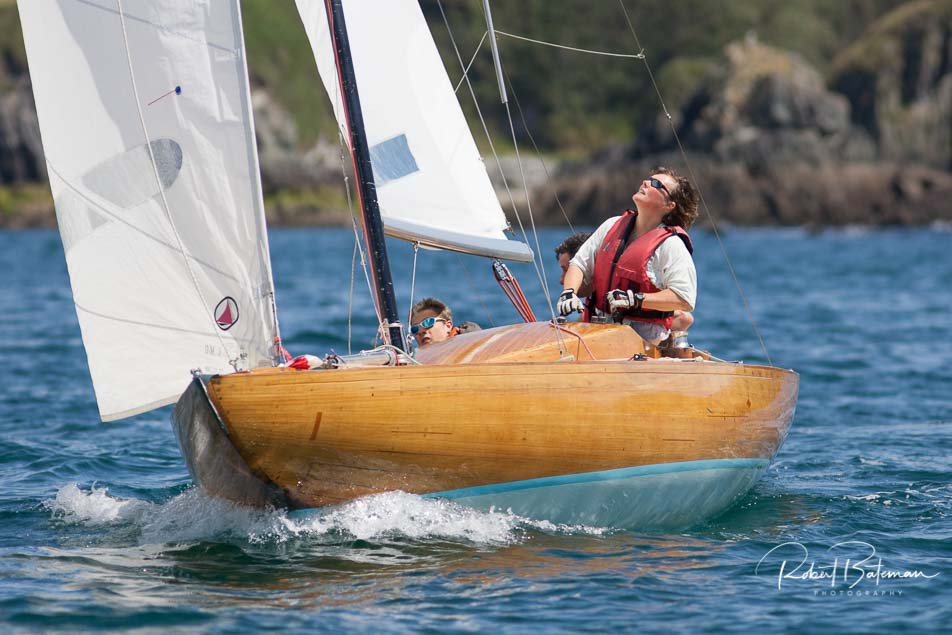
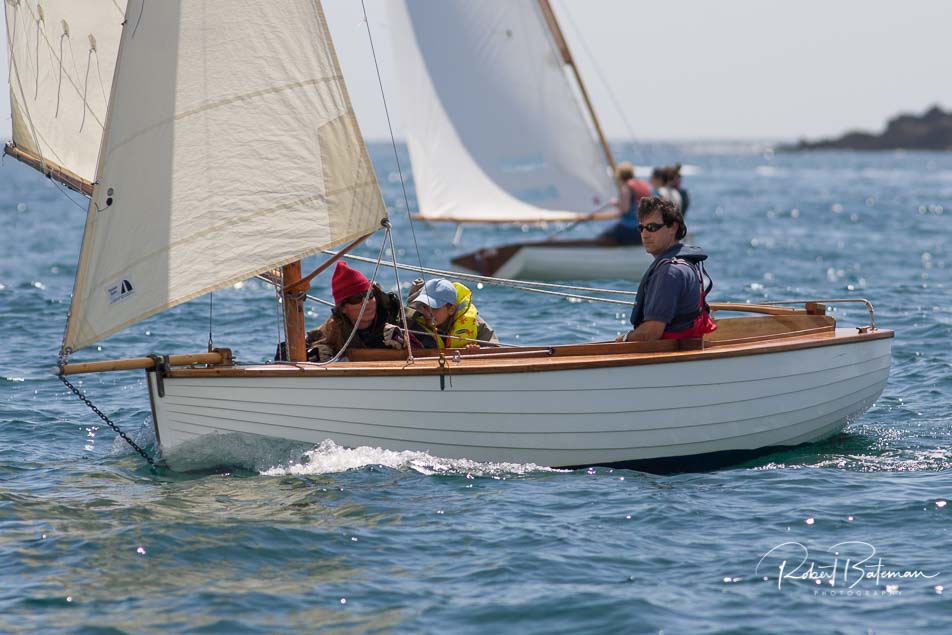
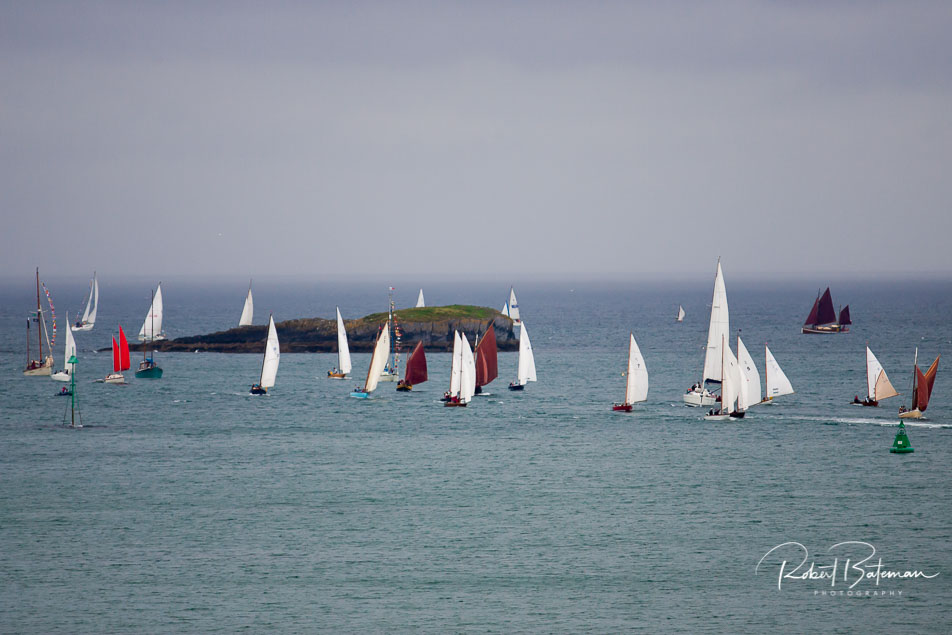
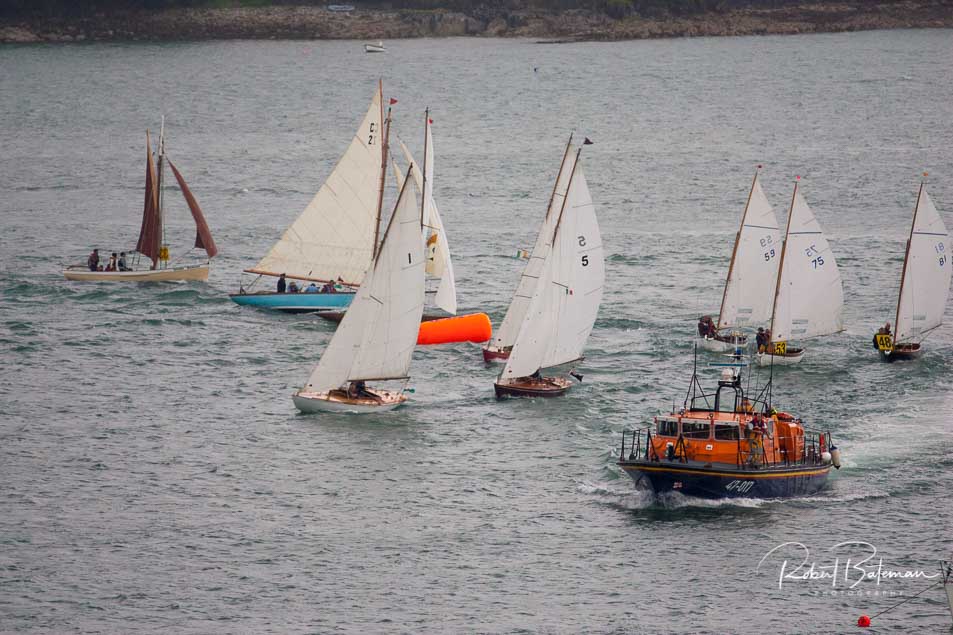
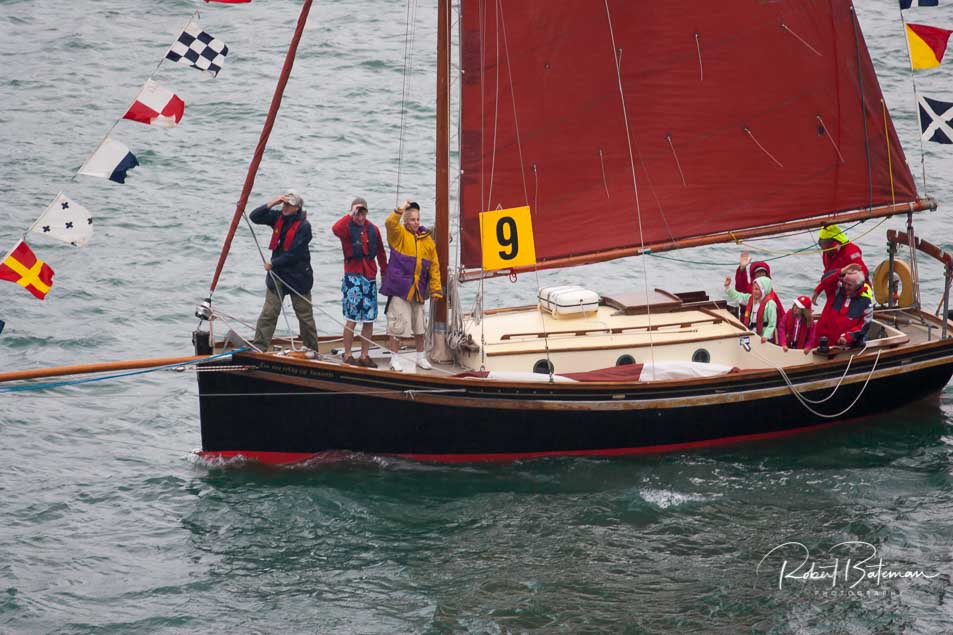
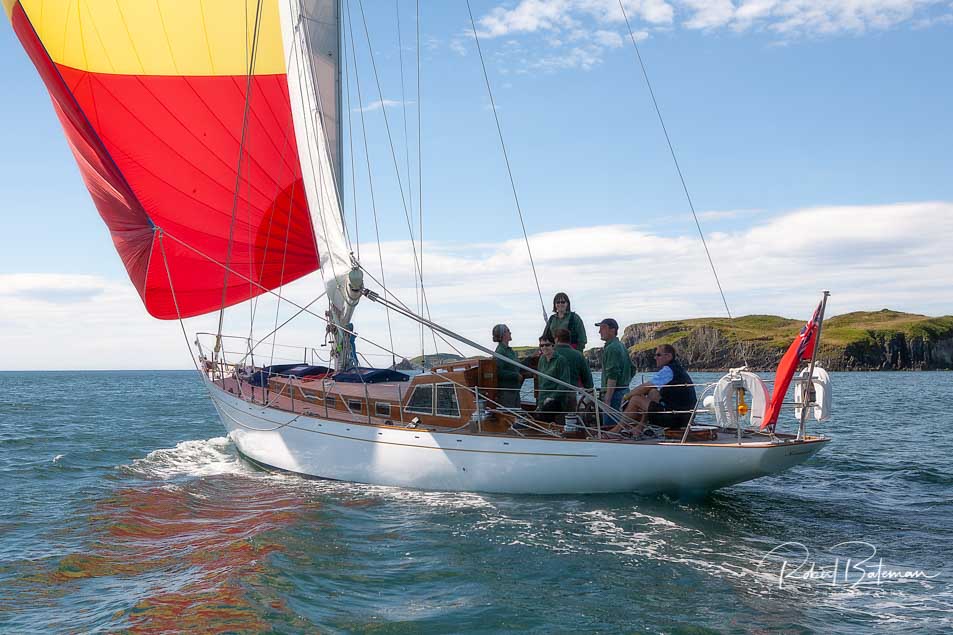
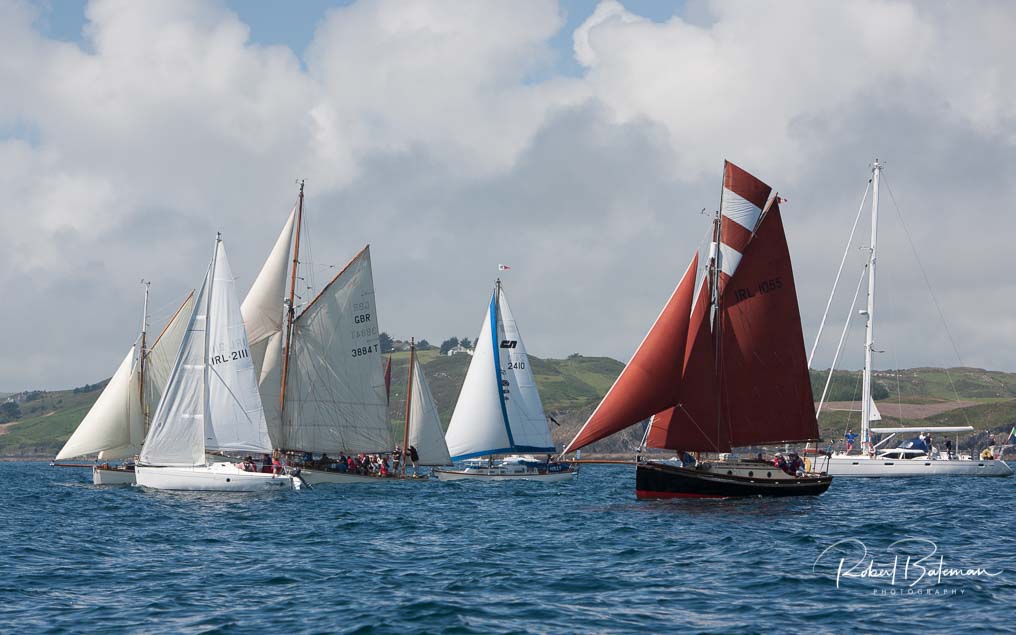
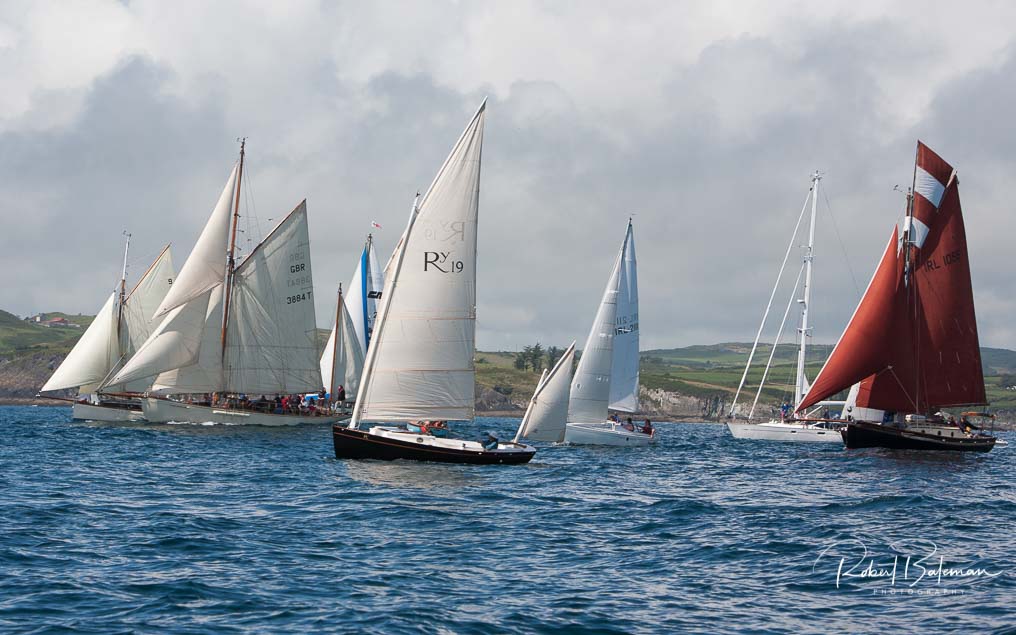
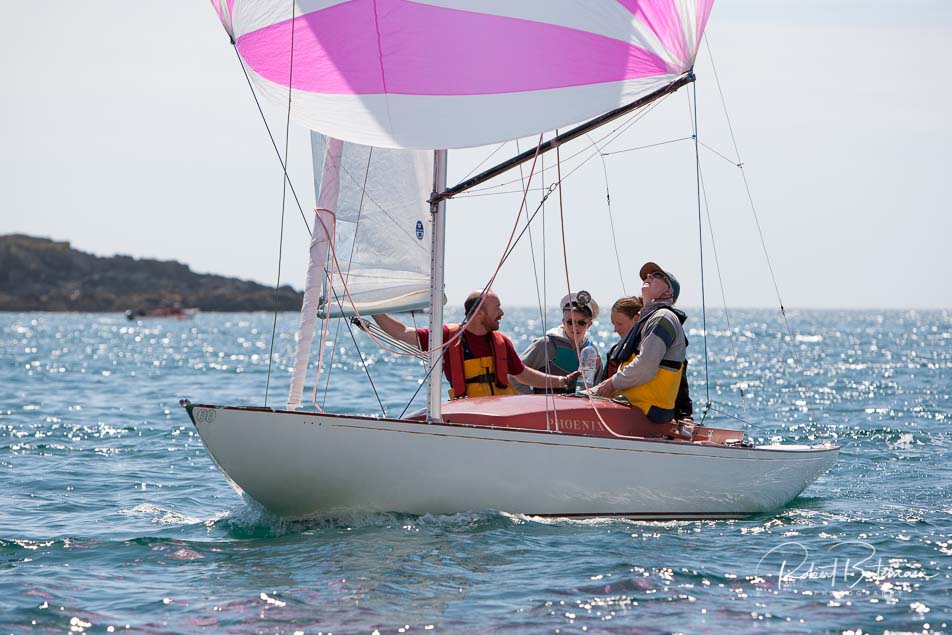
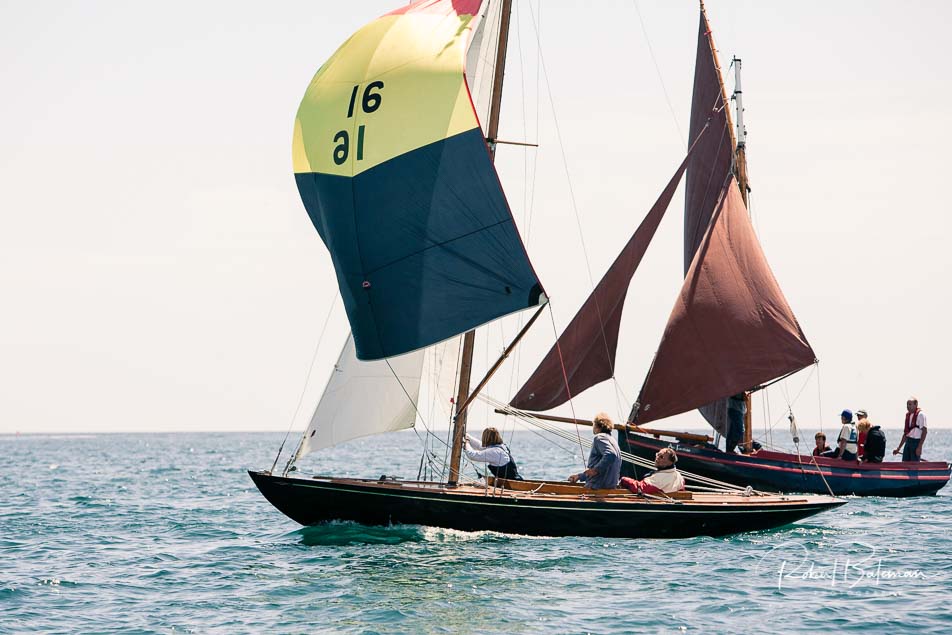
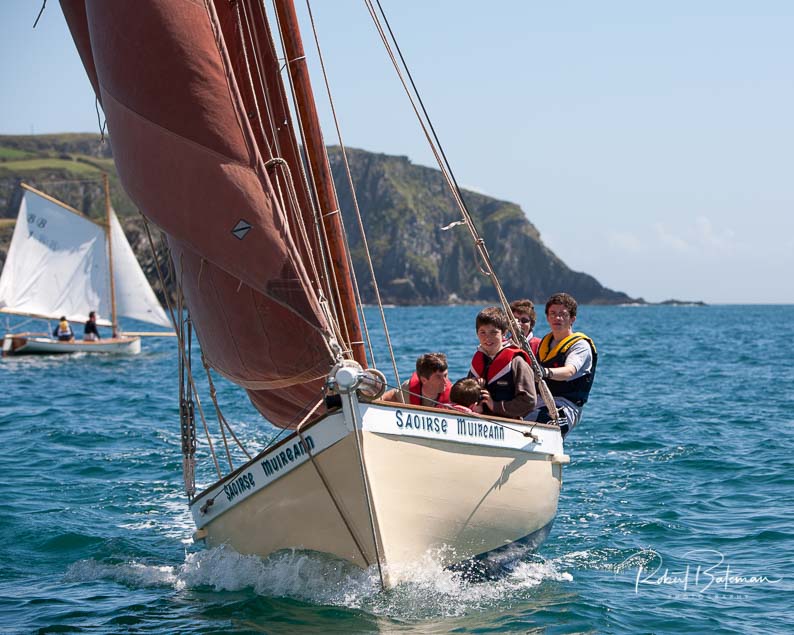
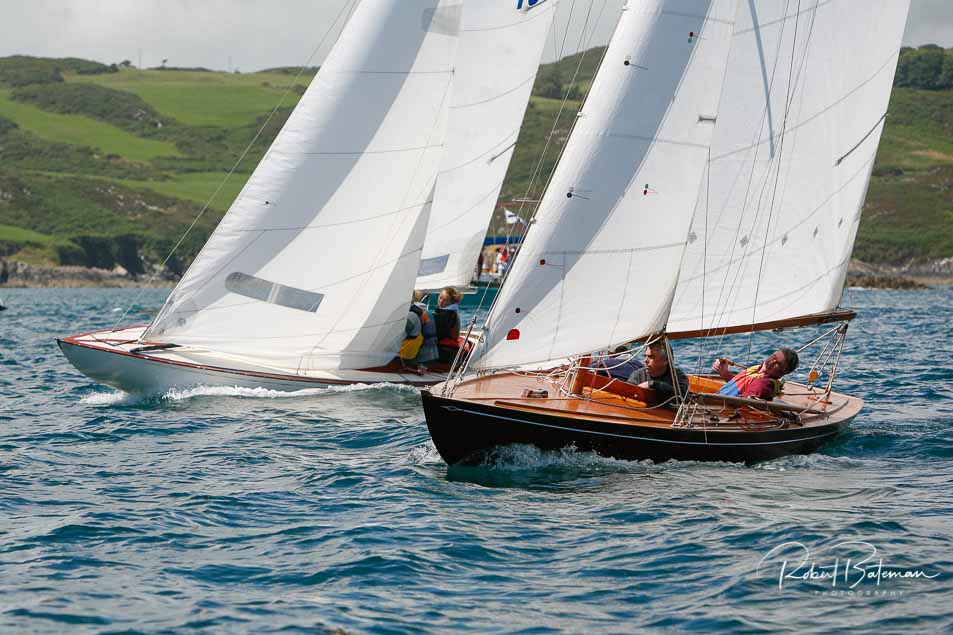
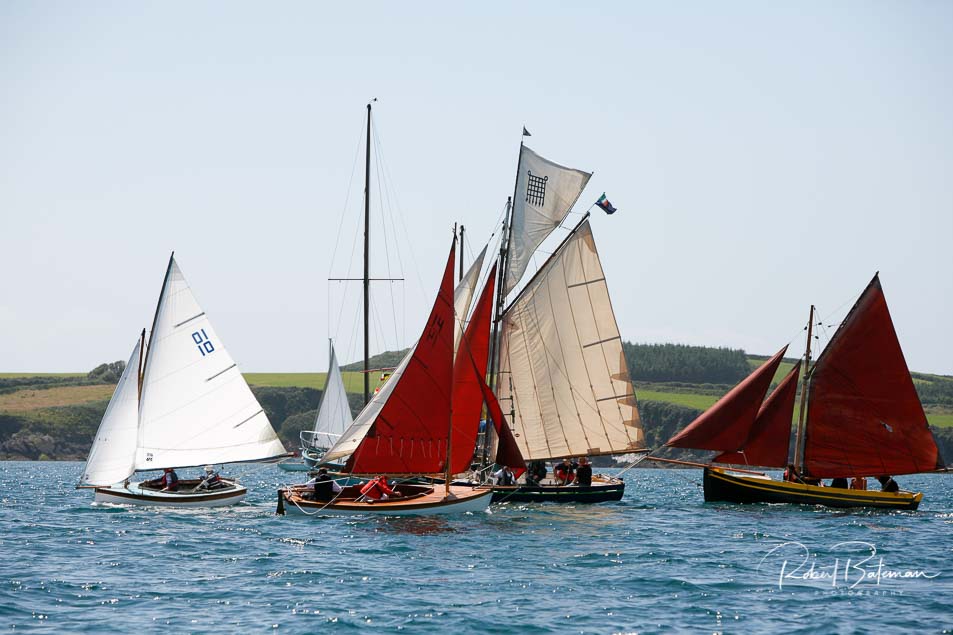
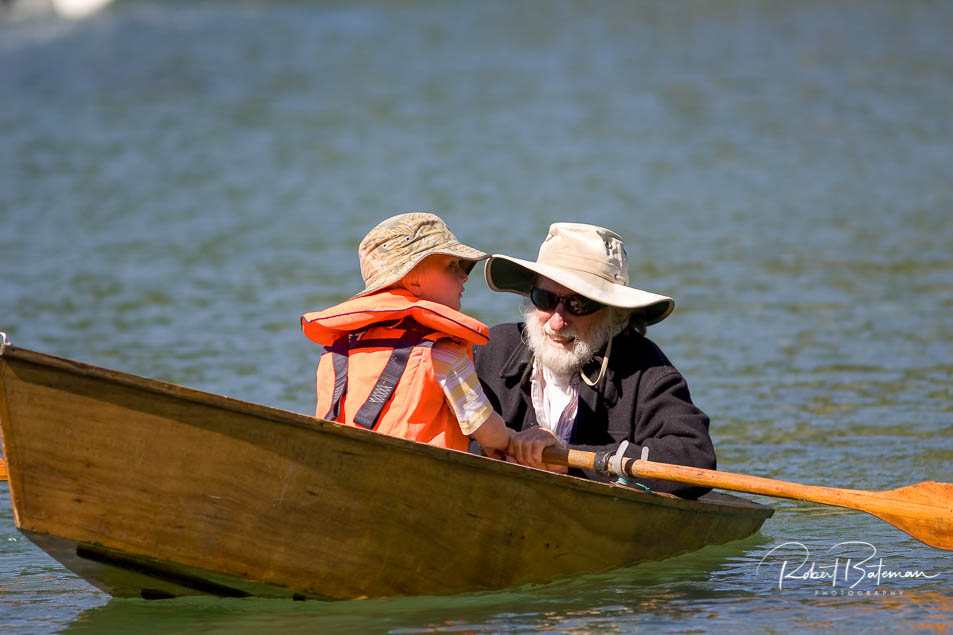
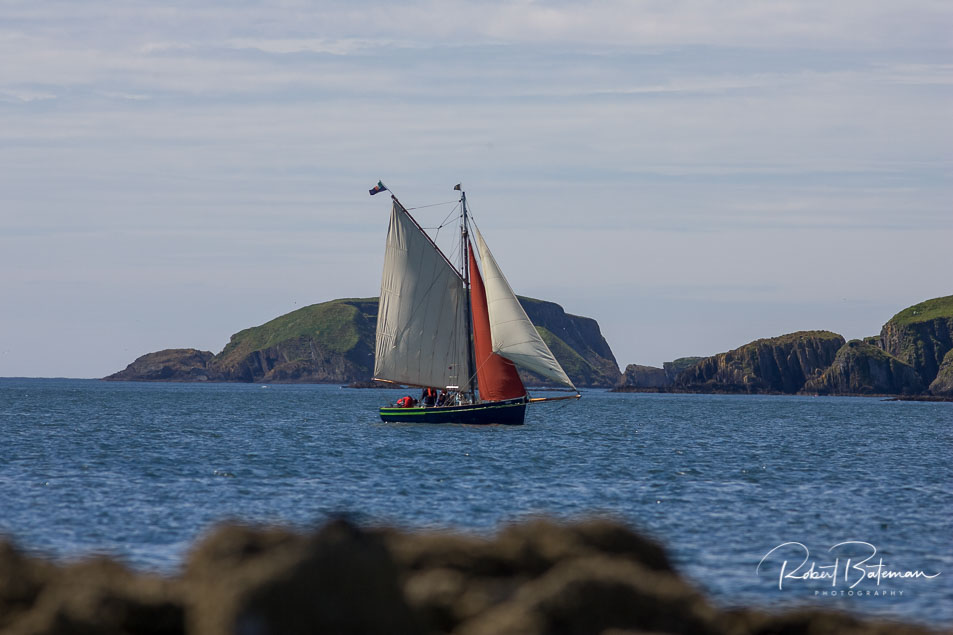
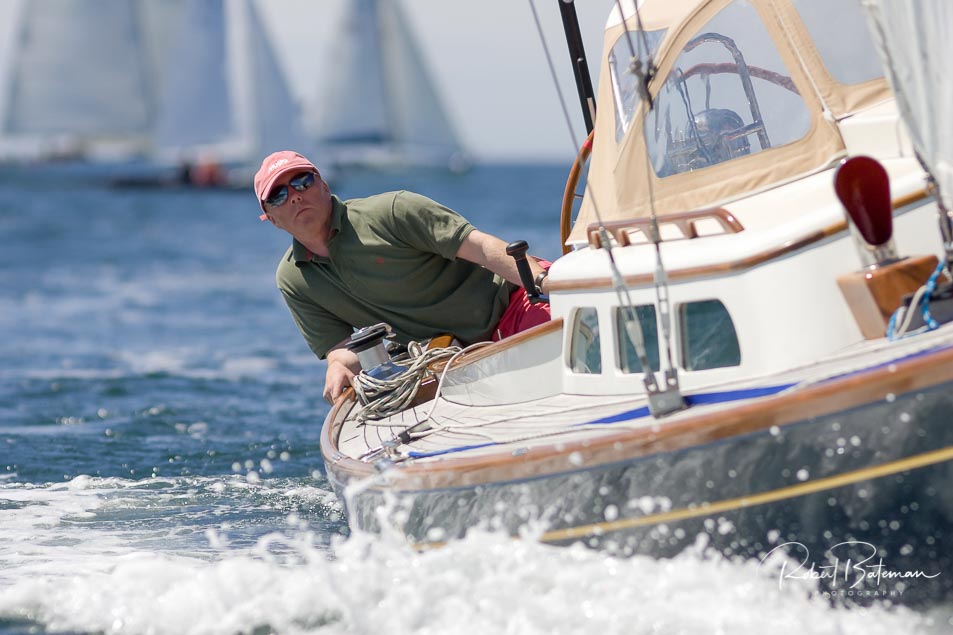
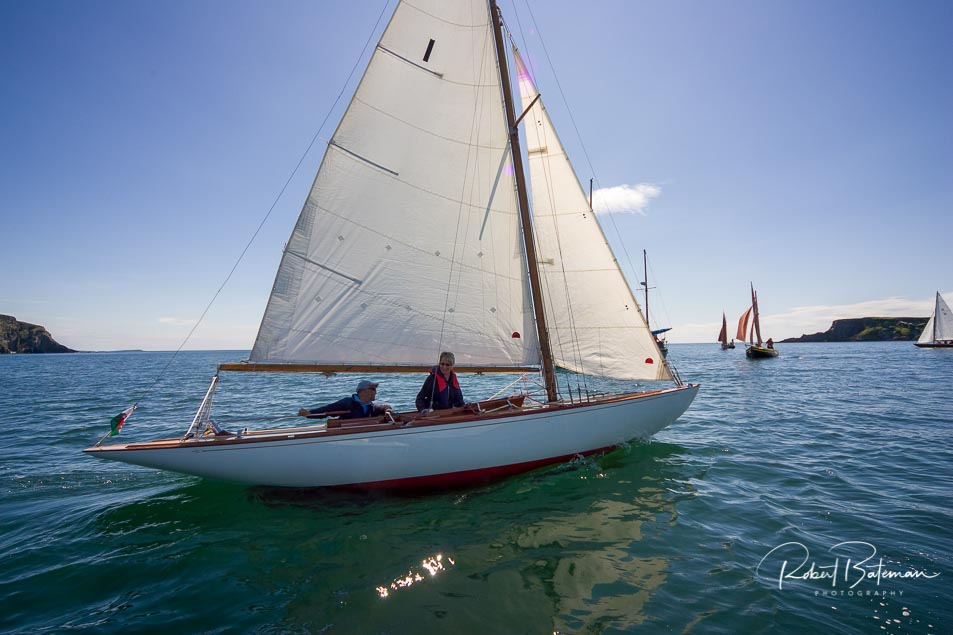
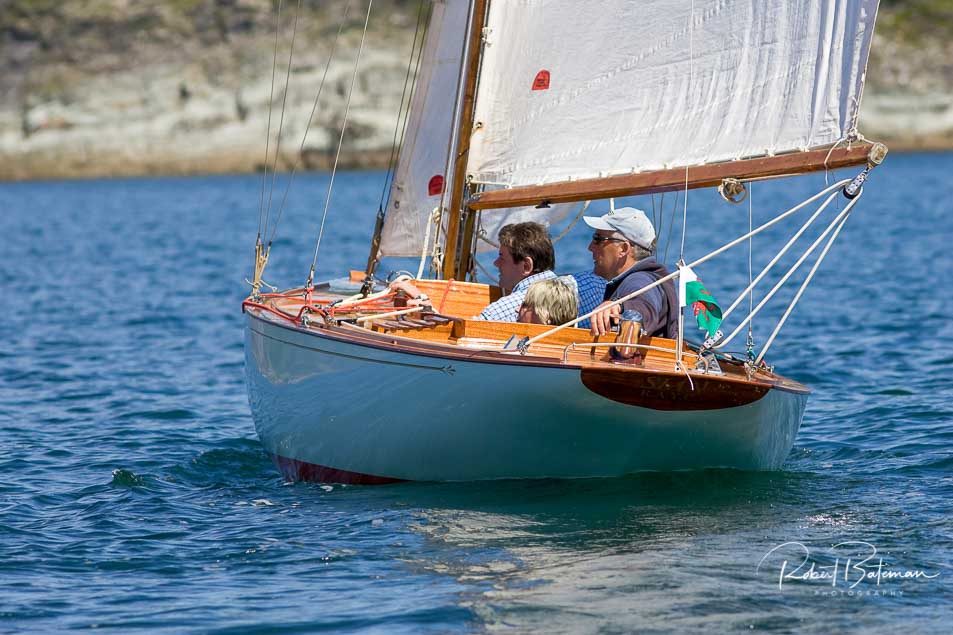
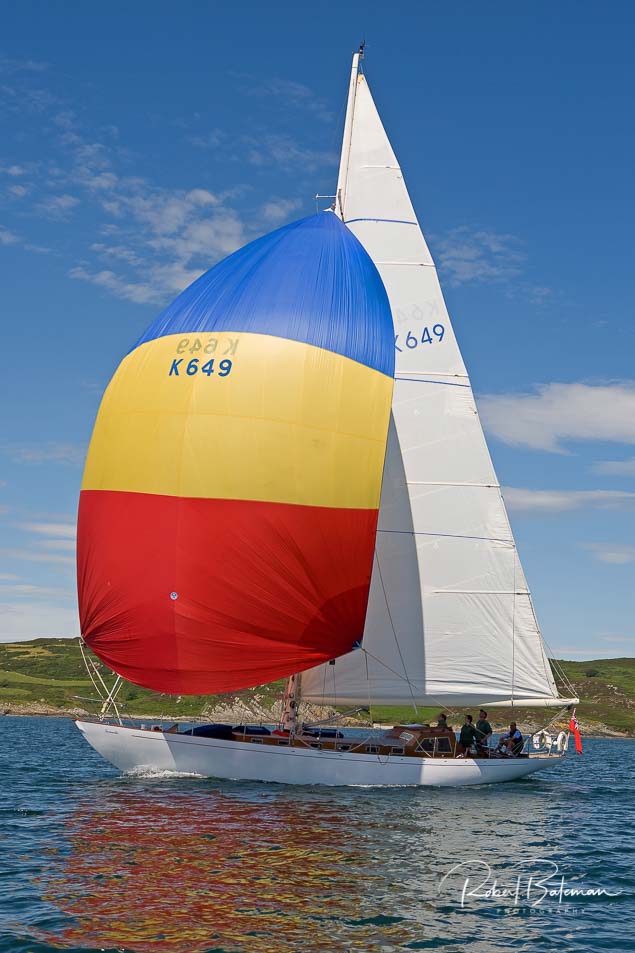
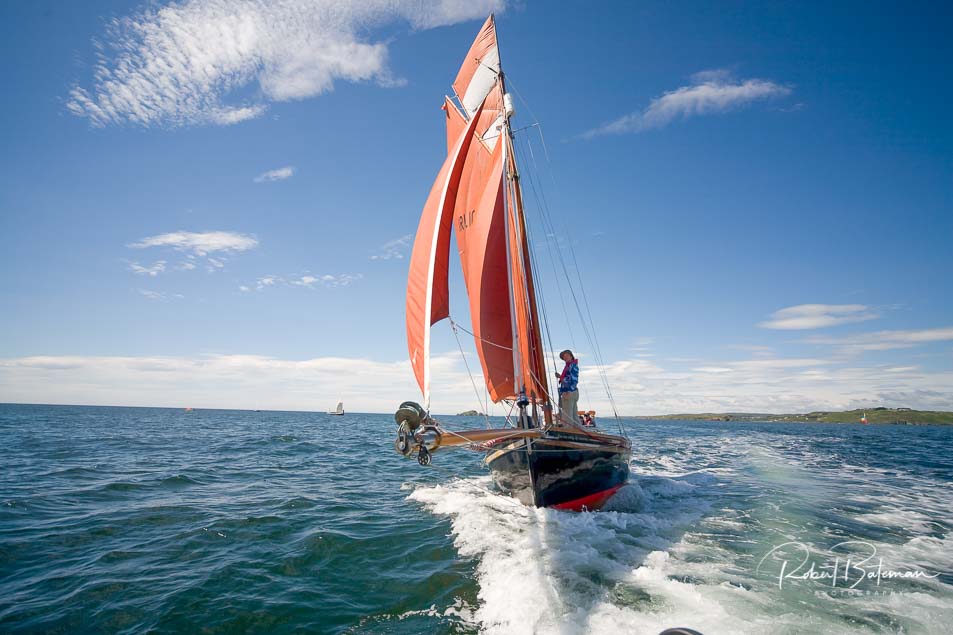
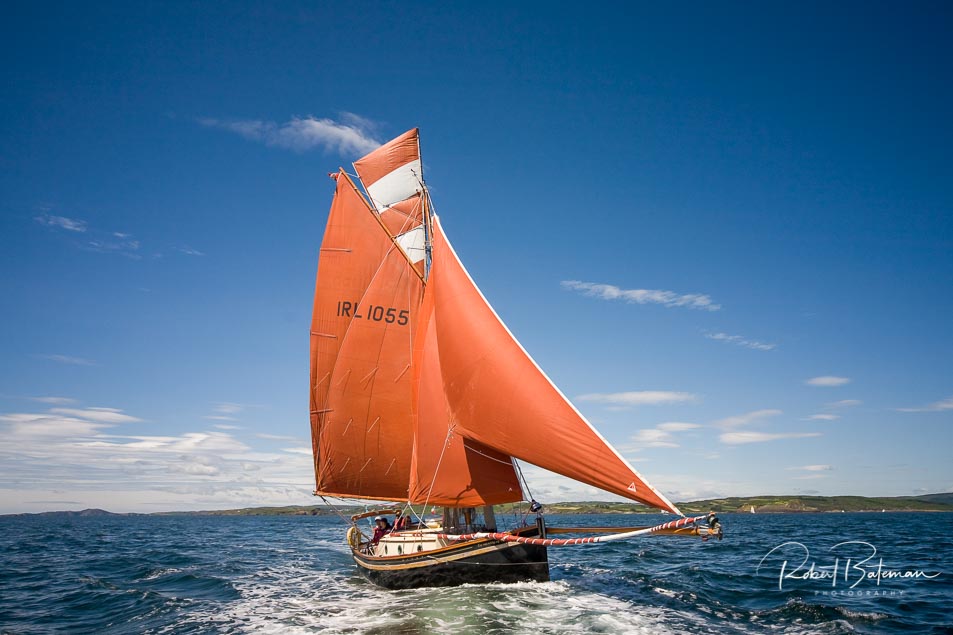
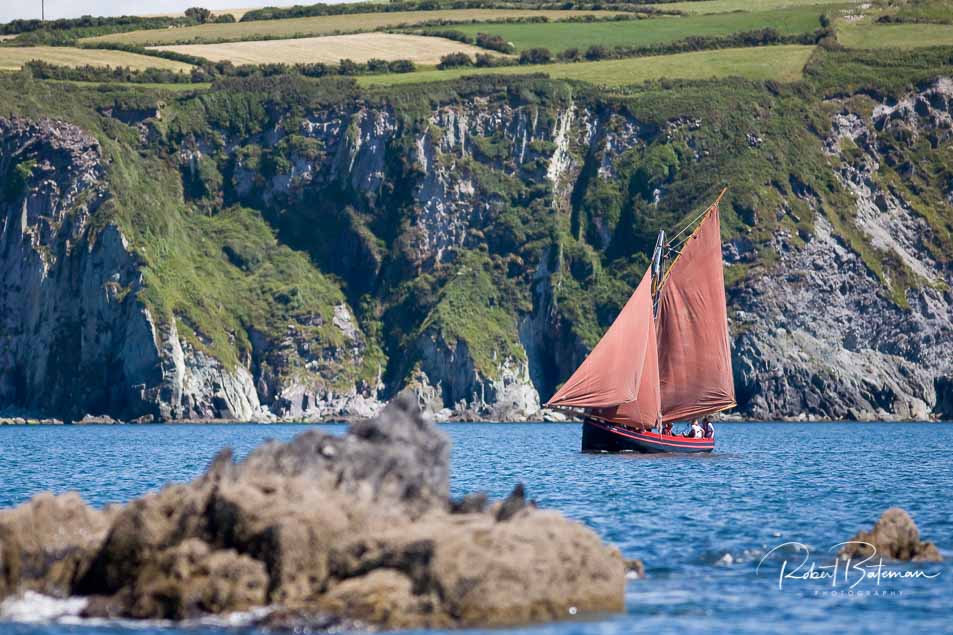
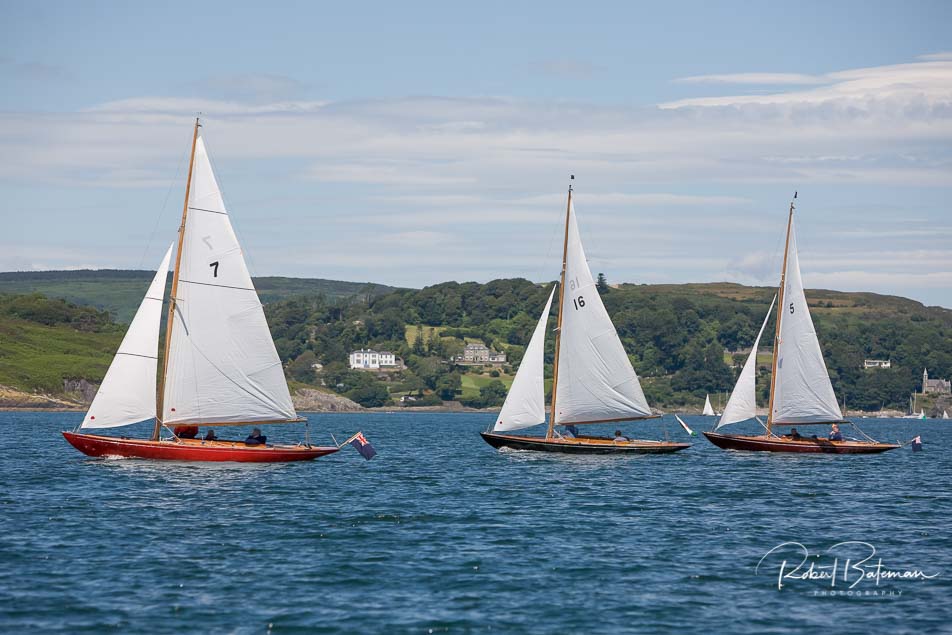
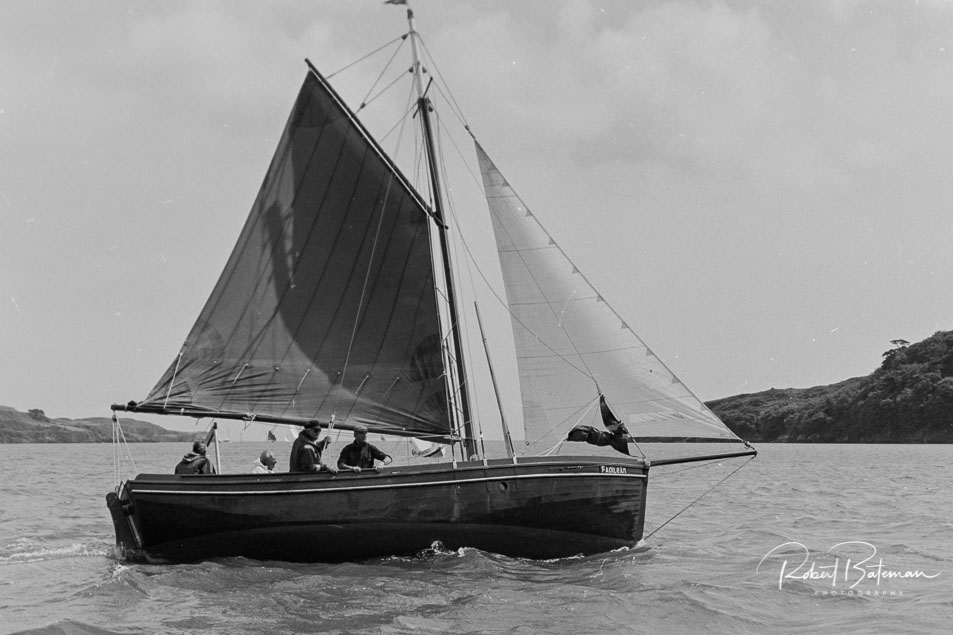
The entry has opened for July's JPF 2020 Glandore Classic Boat Regatta with a 20% discount for all entries until the end of April.
As Afloat previously reported, recognising that there will be an unprecedented ‘Gathering’ of extraordinary boats in Cork to celebrate the 300th anniversary of the Royal Cork Yacht Club, the Glandore Classic Regatta is being scheduled so that classic boats can participate in both events, and then go on to the Cowes Classic Regatta.
Organisers say entries are already starting to come in for the West Cork event. Click here to get to the Notice of Race and online entry.
Glandore Harbour Yacht Club’s Latest Sunday Dinghy League Has Members Hungry For More
From its foundation in 1985, there was always something of a ‘pop-up’ nature about Glandore Harbour Yacht Club in West Cork which would see craft and operations arrive and thrive from early summer to disappear again in September.
This began to change with the purchase and opening of a clubhouse in 2013; gone was the shipping container HQ. The sailing was, however, still confined mainly to summer.
In 2018, club members Kevin Percy, Warren Browne and Tim Forde held a meeting which led to the establishment of Autumn and Spring Dinghy Leagues. It was imagined that it might involve a fleet of five or six dinghies each Sunday. Ronan Daly Jermyn (RDJ) sponsored a perpetual trophy and they were off.
What was intended as a league for young sailors, with a welcome for the not so young, has seen Lasers being dusted off, bought and borrowed by parents and club members in the Masters and Grand Masters age categories, with a member in the Great Grand Master age range showing how it’s done at the front of the fleet.
To reflect and welcome this reality, the club split the prizes into an overall result and U18s result. The recent league also saw the club’s first foray into digital race management by local race officers John Williams and Tim Forde with race management being run and scored from a tablet on the water, the data file being emailed ashore for entry on Sailwave and website publication.
The league has become a very social Sunday event in the clubhouse, with catering by a great team of volunteers and even swimming by the hardiest competitors.
The growth in the league has exceeded all expectations, with 30 boats registered for the recent series, again generously sponsored by RDJ.
The Autumn League closed out last Sunday 20 October with Squib sailor Sean Thompson overall winner and Dragon sailor Peter Hayes winning at U18 — and all the talk was, ‘When are we starting again?’
50 Boats & Counting For Glandore's Classic Boat Festival
As a fleet of Irish historic yachts depart for Morbhian Traditional Yachting Regatta and Dun Laoghaire Regatta announces up to 70 classic boat entries will compete in its inaugural Kingstown 200 Cup, classic boats continue to register for Glandore's Classic Boat Festival that runs from Sunday July 23rd to Friday July 28th. Cuilaun of Kinsale, a 54 ft McGruer Ketch, and MacDuach, a 60ft Galway Hooker have recently signing up. The Old gaffers Tir na N’Og and Helcia have also registered or committed in the last few days, bringing the count to over 50 classic boats so far.
Many of the early registrations are from the UK, Dublin, or further afield, which is to be expected given the logistics involved in sailing to the Fastnet Coast.
Glandore Yacht Club plans four days of exciting racing, as well as the pageantry of the Parade of Sail, and the fun ‘cruise in company’ to Castletownshend with lunch at the celebrated Mary Anne’s gastro-pub. The Water Wags will be coming down from Dublin to demonstrate ‘syncronised sailing’.
The Classic Regatta this year will host a new memorial event, racing the City One dinghies to commemorate their designer, Theo Rye, a talented marine architect who worked on many well know Classic restorations and re-launch projects including Peggy Bawn and the A K Ilen.
The Regatta and racing will be planned to allow time for sailors to visit each other’s boats, exchanging knowledge, experience and complements.
Dragon Sailing Thriving at Glandore Harbour Yacht Club, West Cork
What’s this about the tiny Glandore Harbour Yacht Club having the largest, most active Dragon Fleet in the country? Sally Fegan-Wyles reports from West Cork
On a cold winter night fifteen years ago, a bar-side conversation turned a great idea into reality. GHYC members were reflecting on the lack of local participation in the summer sailing school. Children were coming from Dublin and Cork, or even further afield, but not from the area around Glandore. The problem was that there was no tradition of sailing for fun in the local farming or fishing families. Yachts were for blow-ins.
It was Debbie Bendon who suggested providing free introductory classes to children from the local primary schools, hoping that if they had a great time, some of them might persuade their parents that they should come to the summer school courses. Debbie, Avril Cooke, and Neville Scott started to work with Glandore Primary School Headmaster Vincent O’Neill, and parents Noreen O’Mahoney and Kathleen Hayes to make it happen.
Fast forward 15 years, and meet Kevin Hayes, dairy farmer, former senior sailing instructor GHYC ISA training, and Captain of the Glandore Fleet of 13 Dragons. No one in Kevin’s family had been on the water before the national schools programme started, but now there are five sailing Hayes’, Michele, Clare, Kevin, Rebecca and Peter, three of whom crewed at the 2016 Irish Dragon Championship in Kinsale.
And it’s not just the Hayes, hundreds of local youngsters from four local primary schools (Glandore, Leap, Union Hall and Abbystrewry) have been through the programme, which is now run by Anne O’Mahoney. Many of them have gone on to attend further sailing courses, and are now coming back as sailing instructors, either in Glandore, or in sailing clubs in the US, where GHYC graduates have a great reputation.
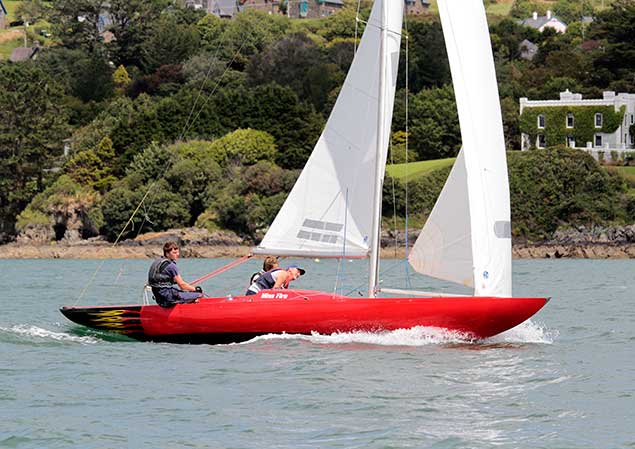 GHYC Dragon class Captain Kevin sailing Miss Fire
GHYC Dragon class Captain Kevin sailing Miss Fire
Interview with Kathleen Hayes
How did you feel when you first heard of the programme?
“Ever since I saw a line of little mirrors coming into the harbor, with the heads of the summer school children hardly up to the sides of the boat, I was determined that someday my children would learn to sail. So we jumped at the chance. Michele was the first, and I went down to the harbor with my camera to watch. She came off the water on such a ‘high’- the fun they had, and the level of excitement- if we could only bottle the joy that those children felt our fortune would be made.”
Was Kevin equally keen?
“He took to it like a duck to water. Normally a rather shy child, he could not wait for us to leave when we dropped him off. Already when he was 10-11, he was helping to teach the children from the other schools. All five of our children then went to the GHYC summer school for the full set of sailing courses, and then did the instructors course. So far Michelle, Clare and Kevin have all worked as instructors, with Rebecca starting this summer, and Peter chomping at the bit.”
And what about yourself?
“I would have loved to sail, but its too late for me to learn. Instead I get out on the water on any boat I can hitch a ride from, and I take pictures. Still trying to capture the joy of sailing”.
A simple idea has changed the nature of GHYC, building a level of local engagement that is not always seen in yacht clubs, and ensuring that GHYC has a very bright future.
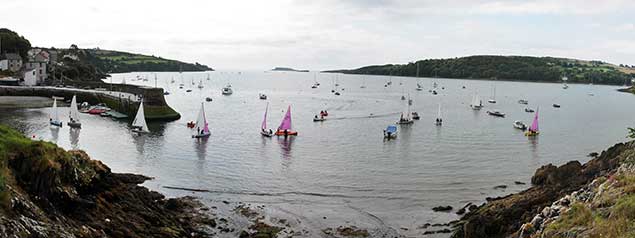 Glandore Harbour Yacht Club national school sail training in West Cork
Glandore Harbour Yacht Club national school sail training in West Cork
Colleen Deas, from Glandore Harbour Yacht Club, a replica of the traditional Dublin Bay class that dates from the 1800's, was sailing in the summer sunshine in Cork Harbour yesterday.



























